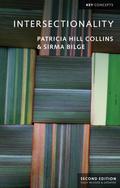Intersectionality
Key Concepts

2. Auflage April 2020
304 Seiten, Hardcover
Wiley & Sons Ltd
Kurzbeschreibung
The concept of intersectionality has become a central topic in academic and activist circles alike. But what exactly does it mean, and why has it emerged as such a vital lens through which to explore how social inequalities of race, class, gender, sexuality, age, ability, and ethnicity shape one another?
In this fully revised and expanded second edition of their popular text, Patricia Hill Collins and Sirma Bilge provide a much-needed introduction to the field of intersectional knowledge and praxis. Analyzing the emergence, growth, and contours of the concept of intersectionality, the authors also consider its global reach through an array of new topics such as the rise of far-right populism, reproductive justice, climate change, and digital environments and cultures. Accessibly written and drawing on a plethora of lively examples to illustrate its arguments, the book highlights intersectionality's potential for understanding complex architecture of social and economic inequalities and bringing about social justice-oriented change.
Intersectionality will be an invaluable resource for anyone grappling with the main ideas, debates, and new directions in this field.
The concept of intersectionality has become a central topic in academic and activist circles alike. But what exactly does it mean, and why has it emerged as such a vital lens through which to explore how social inequalities of race, class, gender, sexuality, age, ability, and ethnicity shape one another?
In this fully revised and expanded second edition of their popular text, Patricia Hill Collins and Sirma Bilge provide a much-needed introduction to the field of intersectional knowledge and praxis. Analyzing the emergence, growth, and contours of the concept of intersectionality, the authors also consider its global reach through an array of new topics such as the rise of far-right populism, reproductive justice, climate change, and digital environments and cultures. Accessibly written and drawing on a plethora of lively examples to illustrate its arguments, the book highlights intersectionality's potential for understanding complex architecture of social and economic inequalities and bringing about social justice-oriented change.
Intersectionality will be an invaluable resource for anyone grappling with the main ideas, debates, and new directions in this field.
Chapter 1 What Is Intersectionality?
Chapter 2 Intersectionality as Critical Inquiry and Praxis
Chapter 3 Getting the History of Intersectionality Straight?
Chapter 4 Intersectionality's Global Reach
Chapter 5 Intersectionality, Social Protest and Neoliberalism
Chapter 6 Intersectionality and Identity
Chapter 7 Intersectionality and Critical Education
Chapter 8 Intersectionality Revisited
Endnotes
References
Patrick R. Grzanka, editor of Intersectionality: Foundations and Frontiers, 2nd edition
"Patricia Hill Collins and Sirma Bilge provide a rich and nuanced framework for understanding the meanings of intersectionality and why it is so powerful for addressing issues of social justice in these times."
Barbara Smith, Co-founder Combahee River Collective "An illuminating and accessible entry into intersectionality, which acknowledges creative tensions between academic inquiry and political praxis. The authors' careful and rigorous work symbolizes the best of what intersectionality has to offer a world that is desperate for new solutions and battle-scarred by quick fixes."
Ange-Marie Hancock Alfaro, University of Southern California
Sirma Bilge is Full Professor of Sociology at the Université de Montréal.


